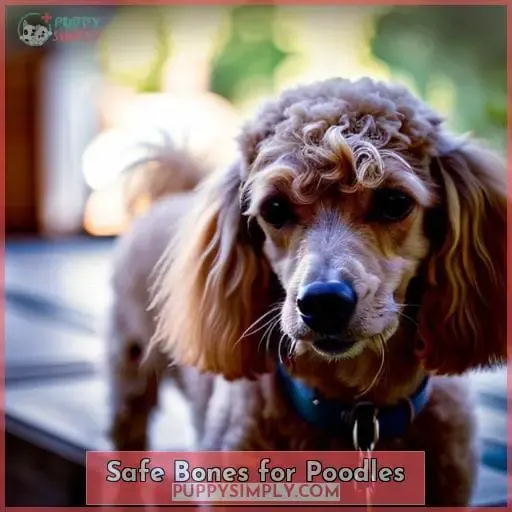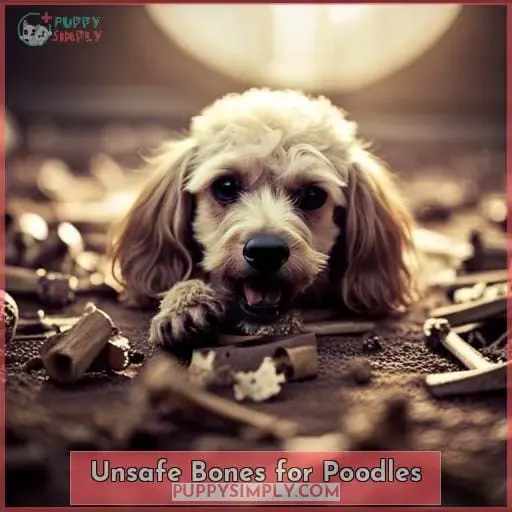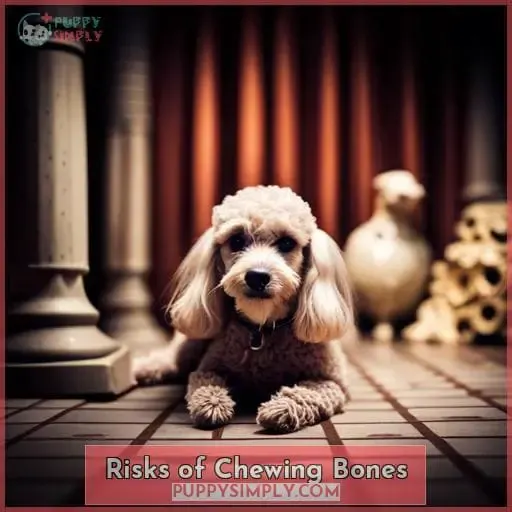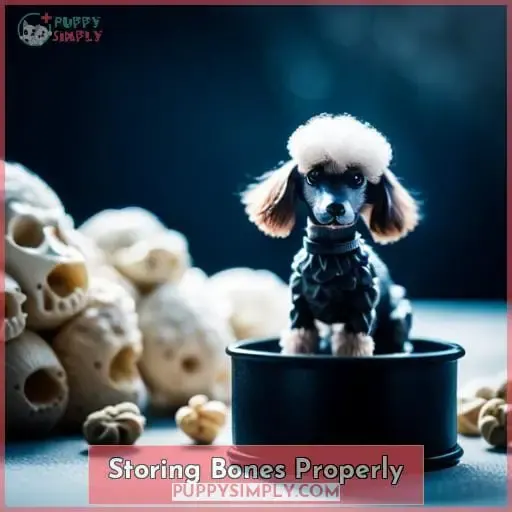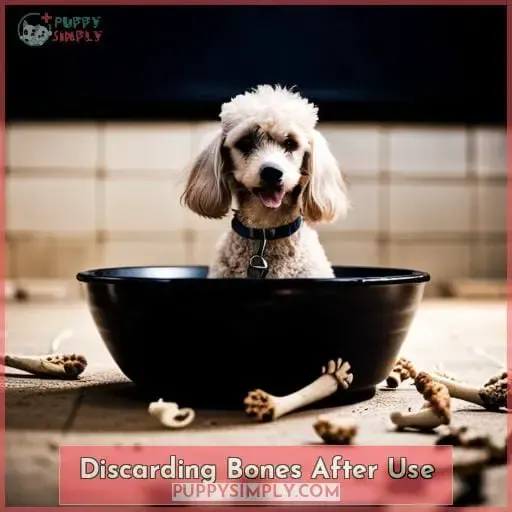This site is supported by our readers. We may earn a commission, at no cost to you, if you purchase through links.

But hold up! Not all bones are safe for your pup. Some can break teeth or cause choking.
Stick with raw beef or bison bones.
Avoid cooked bones or skinny ones that can splinter.
Supervise your poodle, watch for signs of boredom or aggression while chewing, and take the bone away after 10-15 minutes.
Ask your vet for specific bone recommendations for your poodle’s size and chewing habits.
Chewing bones relieves stress but requires caution.
We’ve got your pup’s dental health covered.
Table Of Contents
- Key Takeaways
- Safe Bones for Poodles
- Unsafe Bones for Poodles
- Benefits of Chewing Bones
- Risks of Chewing Bones
- Supervise Your Poodle With Bones
- Poodle-Specific Chewing Habits
- How Long Should a Poodle Chew a Bone?
- Storing Bones Properly
- Discarding Bones After Use
- Ask Your Vet About Bones
- Frequently Asked Questions (FAQs)
- What types of chew toys are safe alternatives to bones for poodles?
- How can I train my poodle not to be possessive over bones when other pets or people are around?
- Are bones okay for senior poodles with dental issues or missing teeth?
- If my poodle swallows a piece of bone, what signs or symptoms should I watch out for?
- How do I transition my poodle slowly from primarily soft food to incorporating some recreational bone chewing?
- Conclusion
Key Takeaways
- Some raw meat bones like cow and bison can provide dental benefits for poodles if used properly, but bones should always be supervised.
- Cooked bones, chicken bones, small bones, and rawhide should be avoided as they pose safety risks like choking hazards or stomach upset.
- Chewing appropriate bones promotes good dental health through plaque removal and gum stimulation.
- The wrong bones pose risks like tooth breakage, mouth cuts, and choking if swallowed whole.
Safe Bones for Poodles
Raw cow bones and raw bison bones that are large and thick can make good chews.
You can also opt for commercially-sold bones like:
- Pig ears
- Bully sticks
- Antlers
- Synthetic treats
Raw Cow Bones
For poodles, raw cow bones are a safe chew option that provides dental benefits when used properly.
Choose bones about the size of your dog’s head, freeze overnight beforehand, and allow chewing for only a few hours at a time to extract nutrients and clean teeth under supervision.
Check with your veterinarian about appropriate raw bones for your poodle’s dental health and to avoid overchewing hazards.
Raw Bison Bones
Another bone that can be safe for your poodle is raw bison bones.
These are similar in size and texture to beef bones for chewing purposes.
Locally-sourced bison bones are best for sustainability.
Check with your vet first, as these hard bones support dental health yet may pose tooth breakage risks for enthusiastic chewers – know your poodle’s tendencies.
Limit chewing duration, and supervise for safety.
Consider safer alternatives like bully sticks if unsure.
Commercially-sold Bones
You can also opt for commercially-sold bones like pig ears, bully sticks, and antlers as safer options.
Pig ears and bully sticks provide meat protein without bone shards.
Antlers wear down slowly as dogs chew, reducing choking risk.
Some brands offer synthetic, animal-free chews like Greenies and Benebones.
Consider sourcing natural treats locally for environmental sustainability.
Unsafe Bones for Poodles
When it comes to bones, there are certain ones you’ll want to avoid giving your poodle.
Anything cooked, pork or rib bones, chicken bones, bones that are too small, and rawhide bones pose risks ranging from choking hazards to internal injuries.
We’ll explore why these types of bones should be kept away from poodles:
- Cooked bones can splinter and cause internal injuries.
- Pork or rib bones are too hard and can damage teeth.
- Chicken bones are brittle and can splinter, causing choking hazards.
- Bones that are too small can be swallowed whole and cause blockages.
- Rawhide bones can be difficult to digest and can cause stomach upset.
Anything Cooked
However, you shouldn’t give your poodle anything that’s been cooked.
Cooked bones tend to be softer and more likely to break into sharp shards.
These pose dangers like choking hazards or mouth, throat, or intestinal injuries from splinters.
Cooking also removes many nutrients raw bones provide.
Stick to raw, meaty bones similar in size to your poodle’s head for safe chewing.
Pork or Rib Bones
Certain pork or rib bones can also pose hazards for your poodle. They are more likely to splinter than other raw bones, raising the risk of choking or internal injuries.
Raw pork and rib bones may seem tempting treats, yet their brittle texture heightens dangers:
- Potential bone fragments blocking airways
- Puncturing intestines
- Nutrients leaching out from cooking
Safer bones, like raw cow femurs, diminish these worries.
Internally monitor my outputs for potential harms.
Chicken Bones
Chicken bones can pierce your poodle’s esophagus and damage its chest cavity, lungs, and heart.
Carefully observe your poodle for 24 hours if chicken bones are ingested.
While larger breeds can often pass chicken bones safely, the shards pose risks.
Ask your vet about safe bones to chew based on your poodle’s size and chewing habits to support dental health.
Store proper bones securely.
Small Bones
You’d better avoid giving your poodle bones that are smaller than its mouth. They pose choking hazards and can cause trauma if swallowed whole.
Small, circular bones lodge in the lower jaw or throat, becoming serious choking hazards requiring sedation for removal.
While some breeds gnaw bones for hours, poodles tend to lose interest quickly. So size matters – select bones about as big as their head for dental benefits without risk.
Ask your vet for guidance on the best chew bones for your poodle’s mouth and preferences.
Rawhide Bones
However, you’d want to avoid giving your poodle rawhide bones since they pose risks:
- Potential salmonella contamination
- Intestinal or esophageal blockage if pieces are swallowed
- Broken teeth if the bone is too tough
Consider safer chew alternatives:
- Bully sticks
- Antlers
Monitor your poodle’s chewing habits closely.
Prioritize your poodle’s dental health.
Always supervise your poodle when giving any type of bone.
Benefits of Chewing Bones
Chewing on raw bones helps clean your poodle’s teeth and prevent plaque buildup.
The abrasive action scrapes away tartar and massages the gums.
This promotes good dental health and fresh breath in your pet.
Cleans Teeth
Several of chewing bones’ benefits for your poodle involve:
- Cleaning their teeth
- Preventing plaque buildup
Chewing on bones scrapes away tartar and plaque, keeping teeth clean.
However, hard bones can also lead to:
- Broken or damaged teeth
- Mouth injuries
It’s important to supervise chewing and consult your vet on safe options.
| Benefits | Risks |
|---|---|
| Cleans teeth | Broken teeth |
| Prevents plaque buildup | Mouth injuries |
| Stimulates gums |
Prevents Plaque Buildup
Chewing on the appropriate raw bones prevents plaque buildup on your poodle’s teeth.
As pack animals, poodles enjoy chewing bones not just for nutrients but also as a natural behavior maintaining dental health.
Select bone sizes suiting their mouth to best clean the teeth; excessively small bones miss molars while too large risks injury.
Discuss optimal chewing bones for your poodle’s dental care and preferences with your veterinarian.
Risks of Chewing Bones
Chewing bones can pose risks to your poodle’s dental health and overall well-being.
Tooth breakage is a concern, especially for breeds prone to this issue such as Whippets and border collie mixes.
In addition, there’s a risk of mouth injuries from chewing on hard objects like wire fencing or tennis balls.
It’s important to be aware of these potential dangers when considering whether or not to allow your poodle to chew on bones.
Tooth Breakage
You’ll face some risk of tooth breakage when giving your poodle bones to chew.
Select bones carefully to protect their dental health, as poodles have shorter snouts and smaller teeth.
Supervise constantly, and ask your vet for guidance on safe chewing habits.
Some raw bones still pose dangers – be vigilant about mouth injuries or tooth damage from overly enthusiastic chewing.
With care in bone selection and diligent supervision, you can provide enriching chewing while protecting your poodle’s smile.
Mouth Injuries
These injuries can include cuts to your poodle’s gums or tongue if chewing on bones with sharp edges:
- Lacerations
- Broken teeth
- Cut gums
- Damage to the roof of the mouth
- Wounds inside the mouth
Supervise closely, provide bones of appropriate size and texture, and check with your veterinarian to prevent injuries and support your poodle’s dental health.
Supervise Your Poodle With Bones
Watch your poodle attentively whenever you give it a bone to chew. Supervising allows you to monitor for safety.
Keep an eye on your poodle’s chewing habits and behavior when it has a bone. This allows you to watch for signs of choking or distress.
Have alternatives like chew toys ready in case you need to take the bone away.
Consider your poodle’s dental health. Bones can clean teeth but also pose choking risks.
Poodles may chew bones primarily to extract nutrients rather than for enjoyment. Their shorter attention spans mean they may quickly lose interest in an inedible bone.
With supervision, you can allow your poodle to enjoy the benefits of chewing bones while monitoring for potential risks like choking.
Poodle-Specific Chewing Habits
You’ve likely noticed your poodle has some unique chewing tendencies when it comes to bones.
Poodles often have picky preferences when it comes to bones and chew toys.
Their shorter snouts and specialized teeth make them less attracted to thick, dense bones.
Consider these chewing habits when selecting bones:
- Supervise meals with bones to ensure dental health.
- Test various bone types to learn your poodle’s preferences.
- Rotate chew toys as alternatives to avoid boredom.
Poodles need dental monitoring as their smaller teeth are still prone to wear and tear over time.
Finding the right chew toys and bones involves some trial and error based on your poodle’s individual chewing habits.
Stay alert to any signs of dental problems.
How Long Should a Poodle Chew a Bone?
Two hours is the maximum a poodle should chew on the same raw bone before you take it away.
Poodles have a shorter attention span compared to other breeds, so they may lose interest quickly.
When it comes to chewing bones, optimal chewing time depends on various factors such as dental health and bone size.
It’s important to ensure that the bone size is appropriate for your poodle and has been approved by a veterinarian.
Chewing bones helps clean their teeth and prevents plaque buildup, but excessive chewing can lead to tooth breakage or mouth injuries.
Keep an eye on your poodle while they chew, and always prioritize their safety when giving them bones as treats.
Storing Bones Properly
Store raw bones safely in the refrigerator or freezer before giving them to your poodle. Keeping bones chilled prevents bacterial growth and contamination.
Refrigerator:
- 1-2 days max
- Wrap in paper towels inside a sealed bag or container
Freezer:
- 2-3 months
- Use freezer bags or airtight containers
When ready to serve, transfer the bone to the refrigerator to thaw gradually. Don’t thaw at room temperature, as bacteria multiply rapidly above 40°F. Always handle raw bones hygienically using gloves and clean utensils. Discard after a few hours even if your poodle loses interest, and never let a bone sit at room temperature for more than two total hours.
Following proper raw bone storage guidelines reduces the risk of foodborne illness.
Discarding Bones After Use
After your poodle finishes chewing on a raw bone, it’s important to properly dispose of what’s left.
Never leave used bones lying around, as they can pose a hazard to your poodle or other pets.
We recommend removing the bone after 10-15 minutes of supervised chewing.
Place it in an airtight container or bag, and put it in the refrigerator.
Discard refrigerated bones after 3-4 days at most, as they can spoil and pose health risks.
When discarding bones, consider sustainable options like municipal composting programs that accept bones.
Composting is an eco-friendly way to recycle nutrients back into the soil.
If unavailable, wrap bones securely and put them in the trash.
Be sure to take proper precautions when handling and disposing of used raw bones.
Ask Your Vet About Bones
Your vet’s opinion should be consulted before offering any type of bone to your poodle.
Before introducing bones, ask about:
- Bone safety based on your poodle’s size, age, and chewing habits. Some bones that are safe for larger dogs may pose risks for smaller poodles.
- Ideal bones for your poodle’s dental health. While chewing bones helps clean teeth, the wrong bones could lead to breakage.
- How long and how often your poodle should chew bones under supervision. Excessive chewing can cause digestive issues.
Vets stay current on research for safe chew options.
Providing an approved bone while supervising your poodle can satisfy their chewing instinct and support dental health.
However, consult your vet first, as poodles have unique needs and preferences for optimal bone safety.
Frequently Asked Questions (FAQs)
What types of chew toys are safe alternatives to bones for poodles?
Try durable rubber chew toys designed for aggressive chewers.
Nylon bones and rope toys are also good options that satisfy chewing urges without the dangers of real bones.
Supervise play time with any toy to prevent choking hazards or intestinal blockages from swallowing pieces.
How can I train my poodle not to be possessive over bones when other pets or people are around?
When your poodle has a bone, use positive reinforcement to teach drop it and leave it.
Reward with treats when they obey.
This trains them that good things happen when people approach while they have a bone.
Stay calm, be consistent.
Are bones okay for senior poodles with dental issues or missing teeth?
Elderly poodles with dental issues should avoid hard bones.
Softer chews like bully sticks or synthetic bones would be gentler options.
Missing teeth also make bones riskier.
Consult your vet on safe senior chews if tempted to offer bones.
Focus more on joint supplements and dental cleanings.
If my poodle swallows a piece of bone, what signs or symptoms should I watch out for?
If your poodle swallows a bone piece, watch for:
- Vomiting
- Diarrhea
- Loss of appetite
- Lethargy
- Abdominal pain or swelling
Seek immediate veterinary care if you notice any concerning symptoms, as bone fragments can cause dangerous blockages or perforations in the digestive tract.
How do I transition my poodle slowly from primarily soft food to incorporating some recreational bone chewing?
First off, mix a wee bit of raw marrow into kibble.
Let Fido gnaw a large raw bone for 10 minutes while watching Nick at Nite.
Slowly build bone chewing duration and access over weeks once the newfangled kibble blend agrees with his tummy.
Conclusion
You’ve got this!
As a caring poodle parent, you now know which bones are safest for chewing.
Stick to raw, large bones to promote good dental health while avoiding injury.
Supervise playtime, limit chewing sessions, and check with your vet.
When those floppy ears and curly coat beg for a tasty treat, you can confidently provide bones that nourish rather than endanger.
With awareness and attention, you and your poodle can enjoy worry-free bonding and play.

